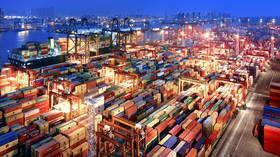Supply chain bottleneck warning issued

A new study by the Royal Bank of Canada (RBC) has found that 20% of container ships are currently stuck in congestion at various major ports. According to the report, published on Tuesday and seen by Reuters, China’s Covid lockdowns, the conflict in Ukraine, and other strains are causing longer delays at ports, driving up costs.
RBC data shows that ships awaiting berth at the Port of Shanghai now tally 344. That is a 34% increase over the past month, with shipping from a warehouse in China to one in the United States currently taking 74 days longer than usual.
The same can be seen in Europe, where ships from China are showing up an average of four days late.
“Global port congestion is worsening and becoming increasingly widespread,” RBC analysts said, acknowledging that it’s hard to say when things will improve. The plethora of problems is having a “domino-like negative compounding effect across various markets,” they added.
According to the report, since the start of the war in Ukraine and the sinking of several ships in the Black Sea, insurers have hiked premiums to between 1% and 5% of the value of ships compared to the pre-war levels of 0.25%.
Meanwhile, marine fuel prices in Singapore, the world’s largest refueling port, have soared 66% over the past year.
“Many market participants thought that supply chains would be untangled by now, but this scenario has failed to materialize,” the report said. It showed that the average global delay of a ship’s arrival was still 7.26 days in March. The figure rarely topped 4.5 days during normal times.
The research also noted that the ban of Russian-flagged vessels from key European ports has led to a re-routed flow and is pushing increased container ship activity at those ports.
The aggregate Time of Turnaround (ToT) for the three largest European container ports – Rotterdam, Antwerp, and Hamburg – are 8%, 30%, and 21% respectively above their five-year normal levels.
“Significant compression of ToT times [is] required before we can confidently suggest a path toward normalizing shipping costs,” RBC analysts said, adding: “The problem? Things are getting worse.”
For more stories on economy & finance visit RT's business section













